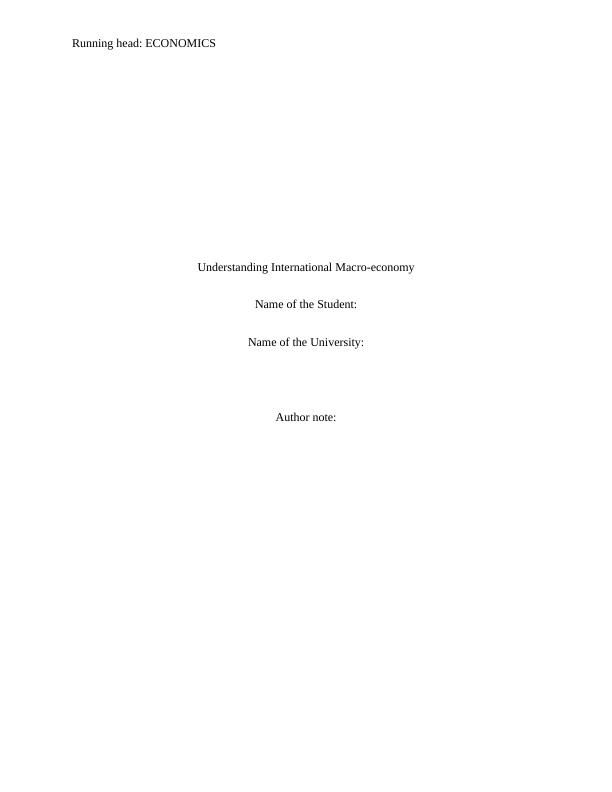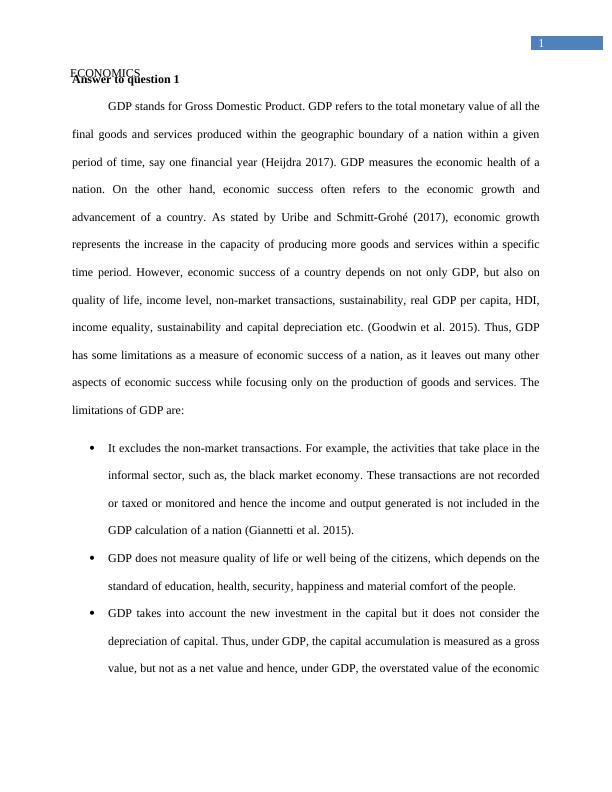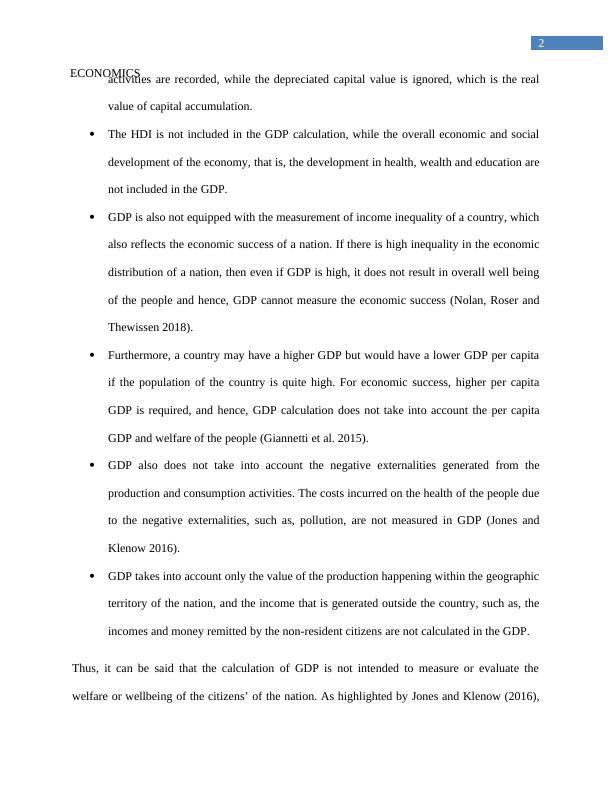Understanding International Macro-economy
Added on 2022-11-28
8 Pages2273 Words167 Views
Running head: ECONOMICS
Understanding International Macro-economy
Name of the Student:
Name of the University:
Author note:
Understanding International Macro-economy
Name of the Student:
Name of the University:
Author note:

1
ECONOMICSAnswer to question 1
GDP stands for Gross Domestic Product. GDP refers to the total monetary value of all the
final goods and services produced within the geographic boundary of a nation within a given
period of time, say one financial year (Heijdra 2017). GDP measures the economic health of a
nation. On the other hand, economic success often refers to the economic growth and
advancement of a country. As stated by Uribe and Schmitt-Grohé (2017), economic growth
represents the increase in the capacity of producing more goods and services within a specific
time period. However, economic success of a country depends on not only GDP, but also on
quality of life, income level, non-market transactions, sustainability, real GDP per capita, HDI,
income equality, sustainability and capital depreciation etc. (Goodwin et al. 2015). Thus, GDP
has some limitations as a measure of economic success of a nation, as it leaves out many other
aspects of economic success while focusing only on the production of goods and services. The
limitations of GDP are:
It excludes the non-market transactions. For example, the activities that take place in the
informal sector, such as, the black market economy. These transactions are not recorded
or taxed or monitored and hence the income and output generated is not included in the
GDP calculation of a nation (Giannetti et al. 2015).
GDP does not measure quality of life or well being of the citizens, which depends on the
standard of education, health, security, happiness and material comfort of the people.
GDP takes into account the new investment in the capital but it does not consider the
depreciation of capital. Thus, under GDP, the capital accumulation is measured as a gross
value, but not as a net value and hence, under GDP, the overstated value of the economic
ECONOMICSAnswer to question 1
GDP stands for Gross Domestic Product. GDP refers to the total monetary value of all the
final goods and services produced within the geographic boundary of a nation within a given
period of time, say one financial year (Heijdra 2017). GDP measures the economic health of a
nation. On the other hand, economic success often refers to the economic growth and
advancement of a country. As stated by Uribe and Schmitt-Grohé (2017), economic growth
represents the increase in the capacity of producing more goods and services within a specific
time period. However, economic success of a country depends on not only GDP, but also on
quality of life, income level, non-market transactions, sustainability, real GDP per capita, HDI,
income equality, sustainability and capital depreciation etc. (Goodwin et al. 2015). Thus, GDP
has some limitations as a measure of economic success of a nation, as it leaves out many other
aspects of economic success while focusing only on the production of goods and services. The
limitations of GDP are:
It excludes the non-market transactions. For example, the activities that take place in the
informal sector, such as, the black market economy. These transactions are not recorded
or taxed or monitored and hence the income and output generated is not included in the
GDP calculation of a nation (Giannetti et al. 2015).
GDP does not measure quality of life or well being of the citizens, which depends on the
standard of education, health, security, happiness and material comfort of the people.
GDP takes into account the new investment in the capital but it does not consider the
depreciation of capital. Thus, under GDP, the capital accumulation is measured as a gross
value, but not as a net value and hence, under GDP, the overstated value of the economic

2
ECONOMICSactivities are recorded, while the depreciated capital value is ignored, which is the real
value of capital accumulation.
The HDI is not included in the GDP calculation, while the overall economic and social
development of the economy, that is, the development in health, wealth and education are
not included in the GDP.
GDP is also not equipped with the measurement of income inequality of a country, which
also reflects the economic success of a nation. If there is high inequality in the economic
distribution of a nation, then even if GDP is high, it does not result in overall well being
of the people and hence, GDP cannot measure the economic success (Nolan, Roser and
Thewissen 2018).
Furthermore, a country may have a higher GDP but would have a lower GDP per capita
if the population of the country is quite high. For economic success, higher per capita
GDP is required, and hence, GDP calculation does not take into account the per capita
GDP and welfare of the people (Giannetti et al. 2015).
GDP also does not take into account the negative externalities generated from the
production and consumption activities. The costs incurred on the health of the people due
to the negative externalities, such as, pollution, are not measured in GDP (Jones and
Klenow 2016).
GDP takes into account only the value of the production happening within the geographic
territory of the nation, and the income that is generated outside the country, such as, the
incomes and money remitted by the non-resident citizens are not calculated in the GDP.
Thus, it can be said that the calculation of GDP is not intended to measure or evaluate the
welfare or wellbeing of the citizens’ of the nation. As highlighted by Jones and Klenow (2016),
ECONOMICSactivities are recorded, while the depreciated capital value is ignored, which is the real
value of capital accumulation.
The HDI is not included in the GDP calculation, while the overall economic and social
development of the economy, that is, the development in health, wealth and education are
not included in the GDP.
GDP is also not equipped with the measurement of income inequality of a country, which
also reflects the economic success of a nation. If there is high inequality in the economic
distribution of a nation, then even if GDP is high, it does not result in overall well being
of the people and hence, GDP cannot measure the economic success (Nolan, Roser and
Thewissen 2018).
Furthermore, a country may have a higher GDP but would have a lower GDP per capita
if the population of the country is quite high. For economic success, higher per capita
GDP is required, and hence, GDP calculation does not take into account the per capita
GDP and welfare of the people (Giannetti et al. 2015).
GDP also does not take into account the negative externalities generated from the
production and consumption activities. The costs incurred on the health of the people due
to the negative externalities, such as, pollution, are not measured in GDP (Jones and
Klenow 2016).
GDP takes into account only the value of the production happening within the geographic
territory of the nation, and the income that is generated outside the country, such as, the
incomes and money remitted by the non-resident citizens are not calculated in the GDP.
Thus, it can be said that the calculation of GDP is not intended to measure or evaluate the
welfare or wellbeing of the citizens’ of the nation. As highlighted by Jones and Klenow (2016),

End of preview
Want to access all the pages? Upload your documents or become a member.
Related Documents
The Economic Health of The USAlg...
|5
|554
|100
International Business Question Answer 2022lg...
|11
|1944
|27
Understanding Human Development Index (HDI) and Unemployment: Economic Perspectiveslg...
|7
|1483
|312
Bachelor of Applied Managementlg...
|13
|2243
|31
Economics Assignment- Gross Domestic Product (GDP) Assignmentlg...
|9
|1349
|54
Economics Study Materiallg...
|17
|2365
|83